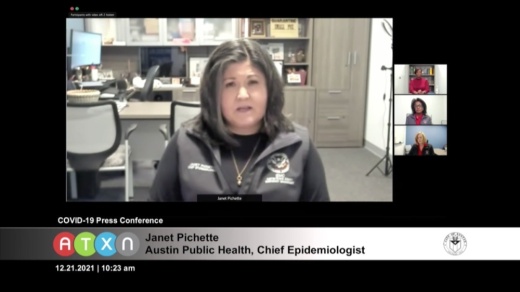Dr. Desmar Walkes, Austin-Travis County health authority, said Centers for Disease Control and Prevention data shows the variant is responsible for over 90% of new cases in the region.
“Right now, according to CDC, omicron makes up 92% of what's circulating in our community, and this is going to impact our community in ways that are crucial to our hospital systems,” Walkes said.
APH Chief Epidemiologist Janet Pichette said that the preliminary reports of three cases of the omicron variant identified by The University of Texas Health Services had been confirmed. None of the three people had traveled recently, indicating community spread of the variant, she added.
“Because we have our three positive cases that had no international travel whatsoever, they had no travel history, we can pretty much surmise from that that there's community transmission here in the Austin area,” Pichette said.
APH officials also cautioned recent data is showing that the omicron variant does not necessarily cause milder symptoms than the delta variant.
“I know when initial data came out from South Africa there was some hope that omicron was not going to be as dangerous as delta, ... but we just don't know yet,” said Cassandra DeLeon, APH chief administrative officer for disease prevention and health promotion. “We are hearing from some data analysis coming out of the U.K. that there's very little difference in the types of effect that omicron is having in comparison to delta.”
Officials added recommendations to combat the virus remain the same, stressing the importance of getting vaccinated or boosted when eligible as well as masking and testing before visiting family and friends during the holidays.
Updated stage thresholds
As result of findings in a UT COVID-19 Modeling Consortium study, APH announced that it will modify its staging thresholds. The threshold for Stage 4 is now a seven-day moving average of 25 new hospital admissions, compared to the previous 30.
The study looked at a range of outcomes with the worst-case scenario yielding the largest COVID-19 surge to date.
Walkes said the findings also showed that the Austin community’s behavior reflected Stage 2 guidelines when the community is in Stage 3.
“We base the decision on the modeling consortium’s data that shows that we currently are performing at a Stage 2 level with regards to behaviors that would stop the spread of omicron,” Walkes said. “Omicron’s much more easily spread than delta."
She added the community is “on the brink of Stage 4, and we need to act as such.”
The community has 113.6 cases per 100,000 people over the past seven days, a high rate, according to the APH Key Indicators for Staging dashboard. It also shows the seven-day moving average of hospitalizations at 15.





